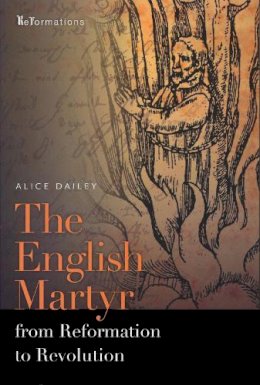Alice Dailey is associate professor of English at Villanova University.
“Dailey has provided an original work of contemporary scholarship . . . . Dailey has insightfully targeted her study at England from the time of its Reformation to its Revolution . . . . Dailey has provided a worthwhile volume.” —Anglican and Episcopal History “Dailey’s prose is lucid and her close analysis of these key martyrological texts portrays the model Christian martyr comprehensively. It is admirable that she tackles martyrologies by both Catholics and Protestants, and across such a broad chronological range.” —English Historical Review “The strength of this book is not just that Dailey discusses the traditions of martyrology. She also discusses the ways in which these traditions changed over time. . . . Her careful and insightful reading of contemporary texts and the thoughtful conclusions she draws from this reading will be of great interest not just to historians of the sixteenth and early seventeenth centuries but to anyone interested in how the modern world was, and is, constructed and how we both create and re-create the stories of the past.” —Journal of British Studies “Alice Dailey’s The English Martyr from Reformation to Revolution makes a persuasive case for the value of the new formalist trend in literary studies. . . . Dailey’s book is a useful contribution to several intersecting scholarly conversations about martyrdom, early modern English religious and political strife, and new formalism more generally. . . . Students and scholars looking to gain a solid, detailed grounding in any of these conversations will find this book very helpful.” —Comitatus: A Journal of Medieval and Renaissance Studies “Alice Dailey’s The English Martyr accounts for a transformation of the Christian martyr narrative through an analysis of four historical stages—paradigmatic establishment, appropriation, crisis of representation, and its ultimate shift in signification. Her account suggests that as historical pressures undermined typological repetition, the language remained while its signification changed.” —Sixteenth Century Journal “Detailed and lucid. . . . A fluent and thoughtful critique of some familiar texts.” —Renaissance Quarterly “By emphasizing the significance of the formal qualities that characterize English Christian martyr narratives, Dailey insightfully demonstrates how attitudes toward martyrdom changed over time. . . . The readings of individual texts are both grounded and provocative.” —The Medieval Review "Alice Dailey’s innovative new study of English martyrology details the transformations undergone by the narrative forms, theological meanings, and visual imagery of sacred suffering in Reformation England. In the period stretching from the sixteenth century through the end of the English Civil War, the Catholic underground was stymied in its search for the glory of the martyrs by the rhetoric of treason wielded against them by the Protestant state, but periodically sustained by its own powerful and resilient treasury of religious narratives. In this broad and bracing study, Dailey conceives of the Catholic question in a pluralist manner, to include not only the fates of individual Catholics and Catholic communities, but also the survival of Catholic literary and architectural forms in post-Reformation England." —Julia Reinhard Lupton, The University of California, Irvine “'Martyrdom is not a death but a story that gets written about a death.' From this simple yet profound premise, Alice Dailey takes us into a tour de force of historical formalism. Martyrdom, as Dailey brilliantly and delicately unpacks it, sits at the nexus of story and the material world. It works through both the suffering of the flesh and the shifting contours of narrative form. In a study that reaches across time (medieval to postmodern) and confessions (Protestant and Catholic), Dailey herself masterfully crafts a compelling story about the life of narrative. This book will naturally be of great value to students of early modern religion, but it will also fascinate anyone interested in how human lives—and the meanings of those lives—are shaped by, and lived through, narrative forms." —Kristen Poole, University of Delaware “Combines historical and literary perspectives in a study of the discourse of martyrdom from Queen Mary’s heresy executions to the beheading of Charles I.”—The Chronicle of Higher Education

